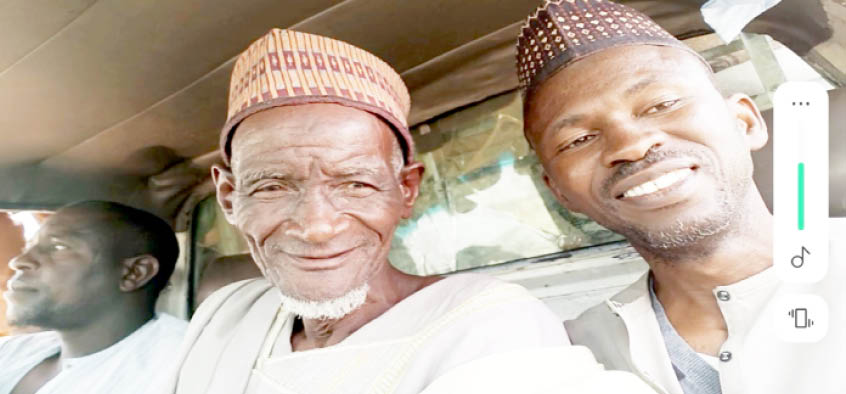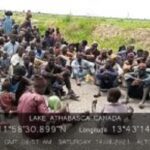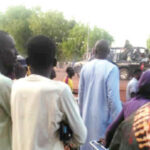It all started with a story I pitched to unravel the truth about the people said to have been killed and the condition of those injured by a military airstrike in Buhari village, Yunusari LGA of Yobe State.
It was a tremulous journey of over 45km off the tarred road from Geidam town that branches onto a bumpy desert route.
My instinct convinced me to embark on the journey despite warnings from government officials and people in Damaturu and Geidam motor parks that the town was under Boko Haram control.
A mechanic, who usually goes to repair their cars and generators, said he has had no encounter with them whenever he was taken there to do repairs.
“Sometimes, they would stop us and siphon fuel from car tanks or collect bread that passengers had bought for their families,” he said.
Initially, I arranged my journey with a driver from a neighbouring village, but to minimise the risk, he (mechanic) advised my ‘fixer’ to employ the services of a particular driver from Buhari village.
Why Nigeria must invest in technology – Pantami
Sultan warns leaders against excessive materialism
My fixer said, “Kaga mun ba barawo ajiyar kaya ke nan (we have given the thief the property for safekeeping.”
All along, I had thought that my fixer would escort me to the community, so to avoid putting anyone at risk, I did not hire a cameraman from Damaturu.
When we contacted the driver, he was silent for a while, then later said I should pay N70,000 for a trip of 45km. The mechanic pleaded on my behalf for the driver to collect N35,000, but he insisted on N45,000.
So we took off in his four-wheel-drive pickup van from Geidam motor park. The rough and bumpy ride began into the desert at exactly 10:35am, the sun already scorching.
The temperature kept soaring as we drove further into the expanse of barren land. It appeared from the approaching distance as if the sky and earth were meeting.
It was a marvel how these people situate the north, east, south or west, in this vast shifting sand. But I roused myself out of the reverie, conscious of the fact that a small mistake can cost one his life in such places.
By my side was the driver, a sturdy man with a hoarse voice who spoke very few words as he sped deep into the desert without any seeming worry.
“How long will the journey take us to and from Geidam?” I asked him. He replied with a heavy Kanuri accent, “At least six hours if you don’t waste much time there.”
As we continued our journey, driving from one sand dune to another, I noticed that far from what it is painted as—an empty and lifeless environment—the desert here is adorned with beautiful plants and animals.
Where the trouble begins
About 30km into the desert, the car made a creaky sound, and then we were stuck on the tip of one of the sand dunes. The driver alighted, inspected the back axle, and said, “It has crashed.”
He quickly handed me three sachets of pure water and pointed at a small date tree – far away from the car – and said, “Go rest under the tree before they bring another back axle.”
Without wasting time, I headed to the date tree; not without being pricked by some thorny desert shrubs.
And all along, my heart had continued to skip a beat each time I remembered the many documentaries of scary encounters in such places. Such as that of a rattlesnake I watched on the National Geographic Channel, in a similar environment.
So, sitting by the tree was a double-edged sword, though my desert-coloured garment helped me melt into the surrounding hue, but I was still restless – with the fear of the dangerous reptiles, Boko Haram terrorists or patrolling Super Tucano fighter aircraft.
The axle was brought around 4:10pm, and already the driver had dismantled the crashed one, so the new one was fixed within a very short time.
“Are we to continue the trip or return to Geidam for mechanics to ascertain whether the car is in good condition?” he asked me. “Yes, it’s very important we go back to Geidam,” I replied without hesitation.
In Geidam, I returned to my fixer, who ordinarily should have been with me in the car, to hear from him why he did not follow us. “I had eye surgery recently, and the doctor advised me not to expose my eye to dust,” was the reason he gave.
At that point, I convinced myself to abandon the journey, realising that my fixer too had no confidence in the safety of the area. “As I earlier told you, Buhari is under Boko Haram control, but with this guy, you have no problem,” he insisted.
At about 5:49pm, the driver said the car was okay, and tried to convince me to spend the night in their village, and possibly complete my work at night so that we could return very early.
My fixer was not too comfortable with that arrangement, but the driver was able to convince me after he answered a few of my questions.
Before we left, I told him to pick up some passengers in the markets, since the car only comes weekly and most of them relied on it to travel home. I could see how his face changed with excitement.
Already, I confided in my mentor in the office, Malam Yusuf Zango, about the risk I was about to take, telling him to raise an alarm if he didn’t hear from me the following day.
Again, the car injector failed in the middle of the desert, and we got stuck again. We alighted, and the driver was able to fix it after many attempts.
There was jubilation after the car picked up, but the 16 passengers of the truck couldn’t push it out of the sand until the driver engaged the gear. We then had to jump into the car and drive on.
Without them, it would have been impossible for us to move an inch.
From that experience, I realised that a driver in the desert is an electrician, mechanic, map reader and compass because, everywhere is a road, the same way several Fulani settlements terminate every road we followed.
After another long distance, the car’s engine ceased automatically. We came down again. As we awaited the verdict from the driver, I raised my head and gazed at the myriad of stars that populate the desert sky and prayed, “Ya Allah! I only have you here, allow me to speak to my family, if this should be my final day.”
At that moment, returning to Geidam was out of the options, so I zeroed my mind to face the fear, and forced my eyes to cherish the regular sight of bush rabbits, flying grasshoppers, chameleons, snakes and other reptiles that cross our path.
It was a lonely journey into the desert, the truck engine was roaring, drifting into the bumpy sand dunes, but the introverted driver only dug his fingers into a nylon bag, picking spicy, roasted meat which he ate.
The ordinary passenger on the desert path is a warrior, he is thrown up and down in the back of truck, holding tightly as the driver negotiates the numerous sand dunes.
The car stopped five times—once in the afternoon, and four under the moonlight but with much struggle and few complaints, we freed the truck from the clutches of the river of sand.
Ruminating through the rigours and hardships of the desert trip, I quickly believed the adage that one cannot think beyond what he sees, feels, hears, or knows.
On our way, not once did the driver, who was born and brought up in Buhari village, miss his way, and this might have been what compounded the fight and defeat of Boko Haram terrorists.
We passed through five unmanned log gates before reaching Buhari. Whenever we reached one, the truck boy would jump down and remove the log.
That reminded me of what the mechanic told me about roadblocks by the insurgents where they collected ‘tax’ from drivers.
I still feel that God had used all those faults and delays of our truck to spare me from an encounter with the terrorists.
On arrival, before they started uploading their goods, the driver sent for two middle-aged men who sneaked me out of the place. I was taken to a room in a remote house.
Before we left, I overheard the driver telling a group of people that I came to the community to condole with families affected by the airstrikes.
Before 12:00am, I was joined by two men, who had arranged the places I would conduct the interviews, under strict rules.
They allowed me to ask questions, record the interviews but warned me not to take pictures in public places, especially at the mosque area.
That sent another shiver down my spine, but when they instructed that we were leaving the village very early, I complied. But I asked to use a few minutes to conduct three more interviews when the sunset.
I couldn’t sleep that night. I tried uncountable ways to douse my fear, but many horrible thoughts kept coming back to me.
However, at around 3am, I found myself waking up from a deep sleep that was cut short by a strange machine sound and low voices. I felt my heart in my mouth, making it very difficult to even recite the protection prayers I learnt from my childhood.
The room I slept in was bare and open, only a plank was used at the foot of its entry to block crawling reptiles.
At 4:50am, my host, Modu, woke me up for the Fajr prayer, but at that moment, my heart and consciousness disagreed on whether to follow him to the mosque or not, a decision I had a few seconds to make.
Around 5am, Modu led me to a very big mosque where both men and women were in the congregation. The women, who are mostly old, lined up in the first row.
After the prayer was concluded, I saw people passing money to the front row, and I also did the same. My host turned and looked at me with a smile.
As we returned home, I met my interviewees already waiting for me, but while conducting the interviews, I noticed some desperation by the driver to hit the road again.
I quickly rounded off and boarded the car. We stopped to pick up passengers, mostly courageous Fulani men, at intervals until we arrived at Geidam town.
I was unable to get telecom service throughout the journey, but to my surprise, it was the call of my fixer that alerted me that the service had been restored.
“Where are you?” he asked, but I could hear a sigh of relief in his voice when I told him that we were very close to Geidam town.
On arrival, he led me to his house where I took my bath, later to s wake da shinkafa joint (rice and beans) before taking another car back to Damaturu.
For many, visiting Buhari village is too much of a risk, which I absolutely agree with, but the humanitarian concern we unravelled and the exploitation of the terrain and inhabitants made it worthwhile. Again, it was a new, additional experience.

 Join Daily Trust WhatsApp Community For Quick Access To News and Happenings Around You.
Join Daily Trust WhatsApp Community For Quick Access To News and Happenings Around You.


